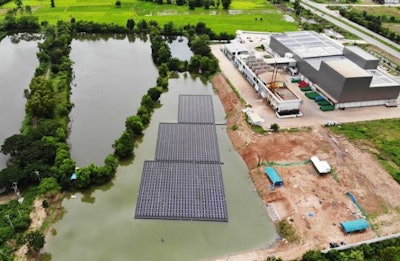
Will end coal use in Thailand within 2022
Charoen Pokphand Foods Public Co. Ltd. (CP Foods) will end coal use for its operations in Thailand within 2022 and transition toward greener and sustainable energy sources, including biomass, biogas, solar energy. The shift from coal to renewable energy sources will help the company achieve energy optimization and reduce greenhouse gas emissions by more than 70,000 tons of carbon dioxide annually.
Peerapong Krinchai, executive vice president – corporate engineering and chairperson of the working group on climate change management water and waste of CP Foods, said the CPF Coal Free 2022 initiative has been implemented with an aim to eliminate coal usage in its manufacturing operations across Thailand within this year and replacing it with renewable and green energy source such as biomass energy from waste materials including wood chips, sawdust, corncobs.
All 12 of the company’s livestock feed mills have stopped using coal for producing steam. Meanwhile, two aquafeed mills and a duck-fowl feather processing plant are phasing out the coal fuel consumption by the fourth quarter of this year.
“CP Foods commits toward sustainable green business. We strive to efficient use of resources in line with the circular economy approach. This effort will reduce production costs and the use of fossil fuels which will, in turn, help reducing greenhouse gas emissions and mitigating global warming. Phasing this out will also help CP Foods to achieve the goal of a net zero carbon emissions organization that was set by CP Foods to support the United Nations Sustainable Development Goals (SDGs),” Krinchai said.
CP Foods has a goal to drive toward a low-carbon organization, with a target to reduce direct and indirect greenhouse gas emissions per unit of production by 25% in 2025 compared with the base year of 2015. To reach this sustainability target, CP Foods has promoted the use of renewable energy such as biomass energy, biogas energy and solar energy, which accounts for 26% of the total energy consumption, enabled the company to reduce greenhouse gas emissions by 575,000 tons of carbon dioxide equivalent.
Krinchai added that, in 2022, the company will continue to promote farm projects and prototype plant that use renewable energy, such as solar energy. At present, solar rooftops have been installed on the roofs of 23 plants and office buildings. CP Foods also set up four solar farms and two solar floating sites. Moreover, CP Foods plans to complete more 60 solar rooftops, solar farms and floating solar sites by 2023, generating a total of 43 megawatts of solar power or equivalent to 62 million units of electricity per year. This green energy project will reduce greenhouse gas emissions by 26,000 tons CO2 per year or equivalent to planting 2.8 million trees per year.
Aside from the zero coal usage milestone, CP Foods recently initiated Working Group on Climate Change Management Water and Waste to drive and support the implementation of such matters, promoting sustainable production and reduce the environmental footprint. This is in line with the CPF 2030 Sustainability in Action, a sustainability strategy that emphasizes on excellent resource management to create a positive impact on the environment throughout the value chain.











